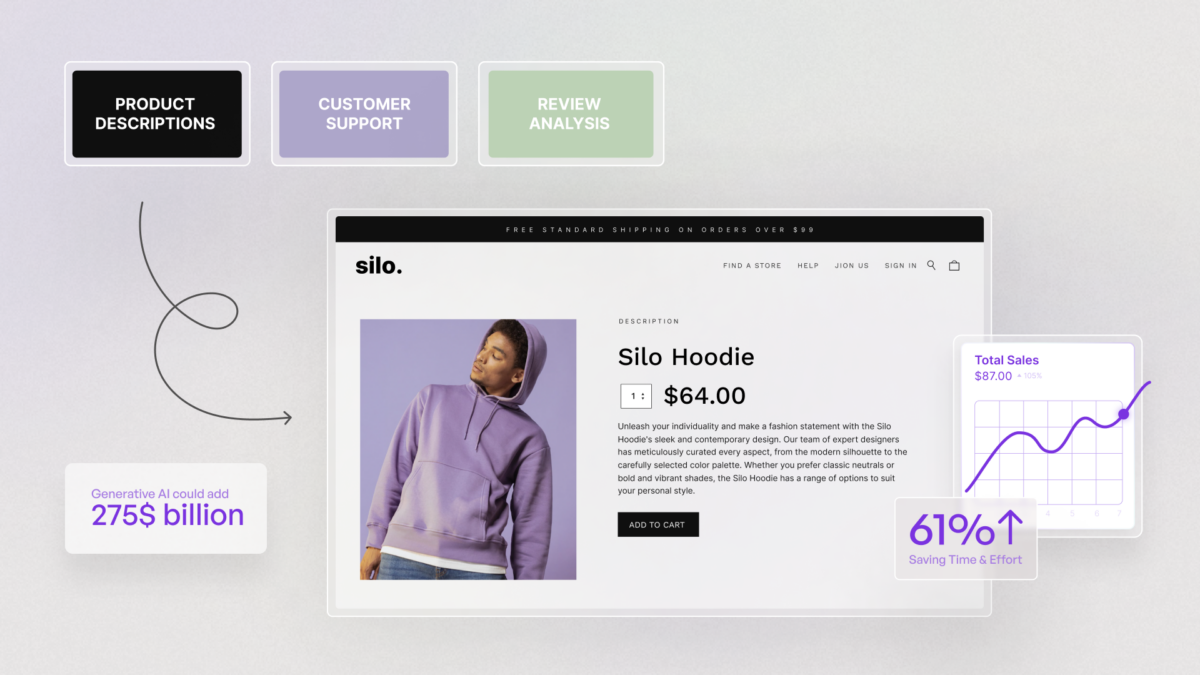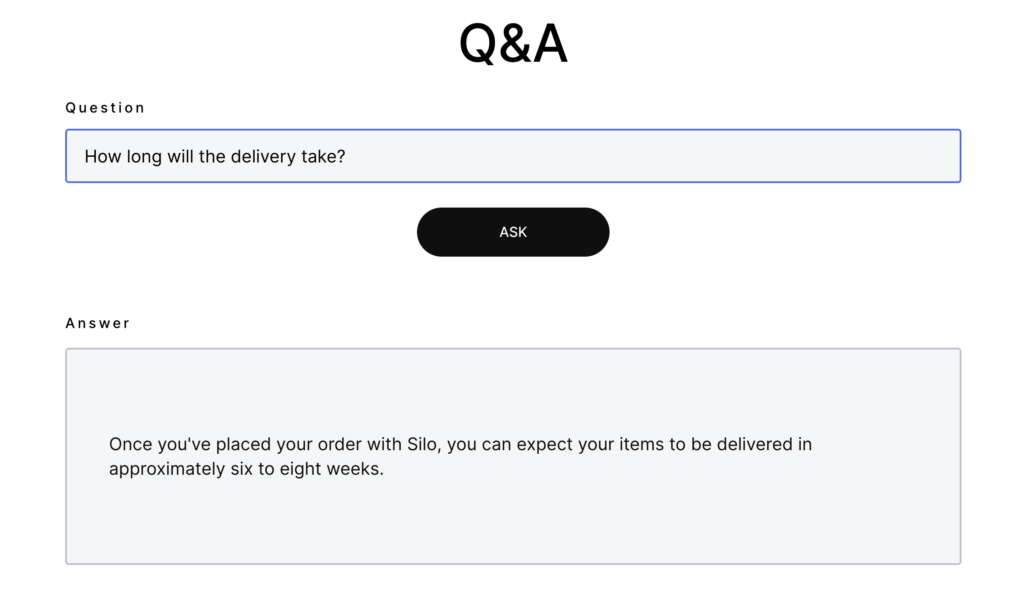Table of Contents

How Generative AI Is Transforming the Retail Industry
Although Generative AI is at its early stages, its potential to disrupt industries across the board has already become apparent. Many industries are already experimenting and beginning to innovate with this technology, including the retail industry, which is showing incredible promise for growth fueled by generative AI.
Let’s explore some of the ways we’ve already seen generative AI benefit retailers, as well as some high-potential opportunities for future exploration.
Product descriptions
82% of shoppers feel product descriptions are extremely or very influential to their purchasing decisions, according to a study by FieldAgent.
However, writing and managing effective product descriptions takes a great deal of time, effort and money, especially for large brands selling thousands of products.
Using AI to improve descriptions
Large language models (LLMs) can be used to generate product descriptions, titles and taglines that incorporate the product’s attributes, the style of description, the brand’s unique voice, and more.
By filling in a few simple details, such as the name of the product and its main features, the writer is able to generate the first draft of a product description with the click of a button.
See example below:

The generated description:

The product description can also be customized according to length, style and tone of voice, so that each product description is generated in a consistent format, and speaks the same language.
GenAI can also create new, or adjust existing, product descriptions at scale, making them more relevant in terms of seasonality or upcoming holidays and events. This is especially helpful for SEO purposes.
For example, let’s consider a product description for a sweater. The original description may look something like: “Stay warm and stylish with our cozy women’s sweater, made from high-quality materials. Perfect for any occasion.”
Generative AI can make this more relevant for the upcoming holiday season by writing something like: “Embrace the holiday spirit with our cozy sweater. Whether you’re attending a family gathering or enjoying a winter stroll, this sweater is the perfect blend of comfort and holiday charm.”
This entire process frees up writers’ time, allowing them to focus on more complex, creative and high-value work, best suited to their skill sets, with the end result being acceleration of time to market.
Customer support
As an ecommerce brand grows, so does its need to give a higher level of customer service.
Customers expect instant, professional and personal online and phone support, which is a costly expenditure for companies, and is challenging to scale.
Using AI to improve support efficiency reduce costs
Using large language models, retail organizations can instantly respond to customer inquiries online, using pre-existing information such as documentation, policies, FAQs and knowledge base articles. This can also help to personalize the customer’s experience, and allow them to have a human-like conversation, and get answers to their specific questions.
In addition, companies can incorporate an “ask me anything” search bar, which can provide contextual answers on return and exchange policies, and present customers with relevant information available on the website. This provides a seamless customer experience, making it easier, more accessible and personalized for each customer’s requirements.
For example, if someone wants to know how long the standard delivery time is, they can simply type their question in the search bar and receive a clear and concise answer, without reading any other irrelevant information.

With generative AI, customers become more self-sufficient, improving their experience and satisfaction, while saving businesses time and money.
Review analysis
Manual review reading and classification play a crucial role in helping businesses identify successes, failures, upcoming trends, and potential market changes. However, this is a time consuming task, which can be extremely burdensome for brands.
Using AI to streamline the review analysis process
LLMs have the ability to process information from each review. They can track sentiment analysis, which determines the emotional tone behind the text, whether it is positive, negative, or neutral, providing real-time, accurate insights into reviews.
LLMs also allow for multi-dimensional classification, meaning they can extract and classify various aspects mentioned in each review, enabling comprehensive categorization and analysis. This multifaceted approach allows brands to gain a deeper understanding of specific aspects of their products or services that are being praised or criticized by customers. This ultimately enables more accurate and efficient insights into customer reviews, providing brands with real-time feedback that can be acted upon quickly.
For example, let’s take a look at this review of bed sheets:

This is not a completely straightforward review, because it discusses the high quality of the sheets, while also conveying the disappointment because of a misleading product description. A LLM will be able to classify both aspects of the review, and categorize them accordingly so that none of the information gets lost.
Start your AI retail journey
Artificial Intelligence (AI) is becoming an essential tool for the retail and ecommerce industries, helping to boost productivity and gain a competitive edge, and we are already working with major players to actualize the vast opportunities that exist for these sectors.
The use of large language models, like those offered by AI21 Labs, can provide retailers with the ability to automate repetitive tasks, offer a high level of personalized customer support, and produce high-quality content that resonates with their target audience. With the continued development and adoption of AI in the retail industry, we can expect to see even more innovation and optimization in the near future.


